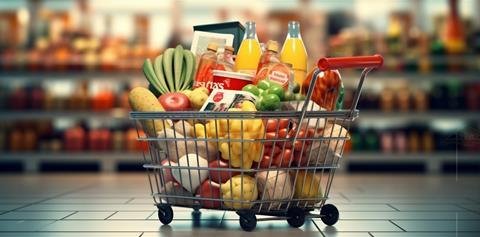Inflation continues to ease, but is still running at 11 per cent according to Kantar
Grocery price inflation has fallen for the seventh month to its lowest rate since July 2022.

New figures from Kantar, for the four weeks to 1 October, put grocery price inflation at 11 per cent. Take-home grocery sales over the same period rose by 9.1 per cent compared with last year.
Tom Steel, strategic insight director at Kantar, explained: “Grocery price inflation is still very high, but shoppers will be relieved to see the rate continuing to fall. For the first time since last year, the prices of some staple foods are now dropping and that’s helping to bring down the wider inflation rate.”
Shoppers buying on deal
A jump in the amount of money spent on offers is also helping to offset the impact of inflation, Steel said. “Supermarkets are looking at all the different ways they can deliver value at the tills and while the emphasis for some time has been on everyday low prices, the retailers are starting to get the deal stickers out again,” he continued.
“Spending on promotions made up over a quarter of all sales in the latest 12-week period at 26.5 per cent, the highest level since June 2022.
“Tesco, in particular, has been driving the increase, with some positive results. The nation’s biggest supermarket saw sales rise by 9.2 per cent over the latest 12 weeks, with its market share edging up by 0.4 percentage points to 27.4 per cent.
“Brands have also done well. Branded promotion sales hit their highest rate since January this year, helping the category grow sales by 7.3 per cent across the 12-week period and narrow the gap with own-label lines, which grew by 10.1 per cent.”
Lidl growing fastest
Lidl was the fastest-growing retailer this month with sales up 15.2 per cent, marking the first time the discounter has led the pack since April 2023 and the growth means it now has a market share of 7.6 per cent, up 0.5 percentage points year on year.
Fellow discounter Aldi’s sales were up by 14.9 per cent, with its total share of the market now at 9.9 per cent, up by 0.6 percentage points compared with a year ago.
Sainsbury’s share grew to 14.8 per cent as its sales increased by 9.1 per cent compared with last year. Asda and Morrisons now hold 13.7 and 8.6 per cent of the market respectively.
Amid reports that Waitrose could become the latest retailer to partner with Amazon for grocery delivery services, total online trips increased year-on-year for the first time this month since December 2021, by 3.1 per cent. Waitrose has a 4.6 per cent share with sales growth at 5.3 per cent for the latest period.



